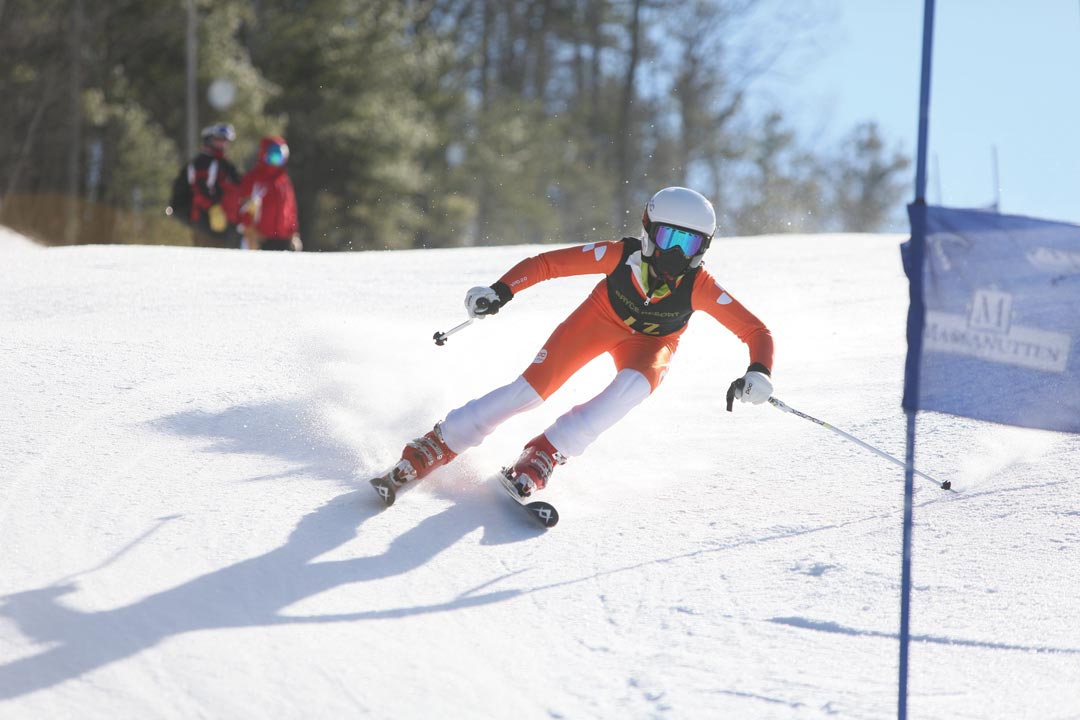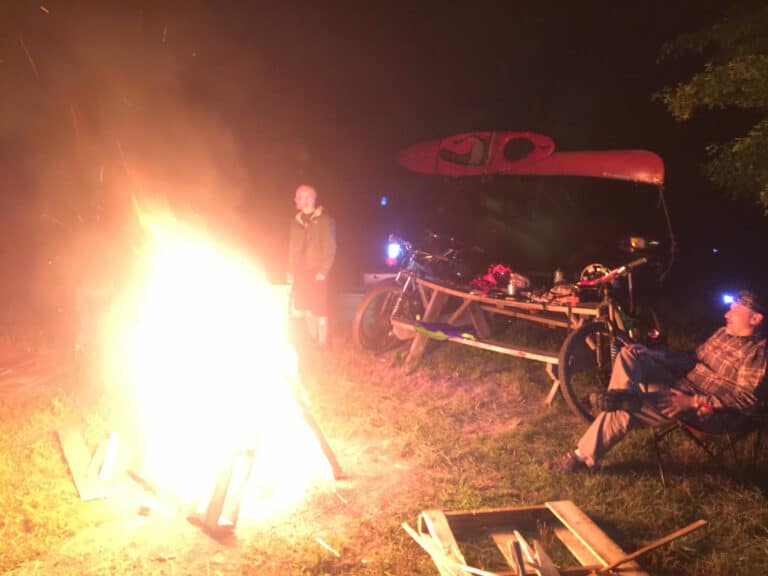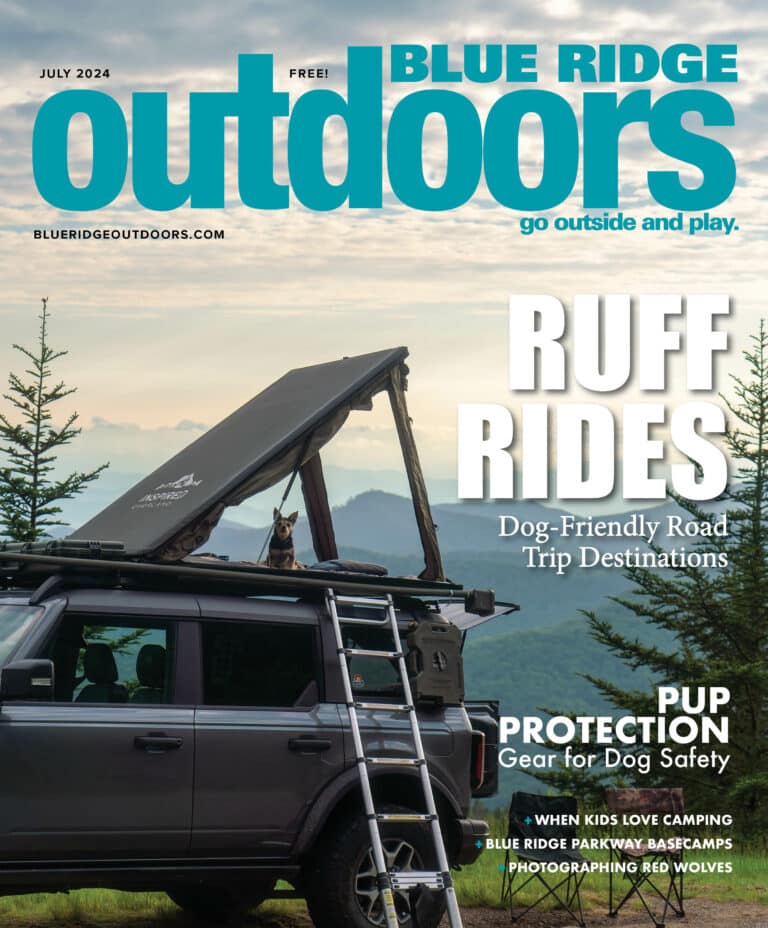The rising stars of Ski Racing in the Southeast
The Southeast is known for its access to outdoor adventures, from hiking the Appalachian Trail and climbing in the New River Gorge to paddling the Narrows of the Green River and biking the Great Allegheny Passage. But it’s not a region necessarily known for its competitive ski racing.
“The weather is a real roller coaster ride in the Southeast as far as temperature,” said Chris Shepard, a coach for the Wintergreen Race Team. “For ski racing, you need a surface that is cold and is frozen. We don’t always have that because of the temperature fluctuations that we see in our region. So we might have really good, solid snow on a Wednesday, and then by Saturday when it’s training day, it can be a little bit slushy. That’s an inconsistency you wished you didn’t have if you were trying to train ski racers all the time.”
Skiers in the Southeast also have to contend with significantly smaller mountains and shorter runs.
“You ski and then you’re on the lift,” Shepard said. “If you go out West, you can ski and ski and ski and ski and ski and ski and then get on the lift.”
But since Shepard took over the Wintergreen Resort ski team in 1997, the program has grown from 18 kids to 150 kids participating on the race team, the development team, and the free ride team.
Families from as far away as D.C. and Virginia Beach make the trek to the mountains every weekend for instruction and competitions.
“Ski racing, especially in the Southeast, is truly a family sport,” Shepard said. “Folks who get into it have to be pretty passionate about it because most of them are driving a bit to get to the resorts.”
Nicole Weiss and her husband, David, have been big skiers their entire lives. They started their three boys on the slopes at a young age, not long after they were able to balance and walk on their own. When they moved their family of five from Michigan to Virginia, they feared their dreams of having a skiing family would never be a reality.
Then the Weiss family discovered Wintergreen, about 45 minutes from their home in Charlottesville, Va. After meeting Shepard at a parents’ meeting and hearing him speak, Nicole Weiss said she knew this was the program for her boys.
“The coaches are really what makes a huge difference,” she said. “If you’re in this program to develop an Olympic ski racer, then he’s on your side and he’s going to help you do that. If you’re there to have fun, he’s also there to do that too. That’s really what has kept us here.”
Braeden, 13, Cooper, 11, and Dalton, 10, each spent two years with the development team before moving up to the race team.
“Everybody thinks their kid is a great skier if they can point their skis down and bomb down the hill a million miles an hour,” Weiss said. “The development team actually teaches them that just being out of control and skiing fast is not the way to develop into a racer. They slow them down and it drives the kids crazy.”
The whole Weiss family gets involved with the racing. Nicole works with the Wintergreen Boosters, a group that fundraises to help purchase equipment and subsidize the coaching staff. David is on the ski patrol, and his skills as an orthopedic surgeon have come in handy a few times.
And every year, the three boys look forward to the new race season.
“When it stops being 75 degrees and it cools off a little bit, I start seeing them pulling their boots out and trying their skis and seeing how they’ve grown,” Weiss said. “And it’s just an assumption that winter is for ski racing, even though it’s Virginia.”
The boys race through the Southern Alpine Racing Association (SARA), a division of U.S. Ski and Snowboard encompassing North Carolina, Virginia, and West Virginia. The organization supports nine ski resorts’ teams, including Snowshoe Mountain Resort, Timberline Four Seasons Resort, Winterplace Ski Resort, Bryce Resort, Massanutten Resort, Wintergreen Resort, Appalachian Ski Mountain, Beech Mountain Resort, and Sugar Mountain Resort.
Racers, ages six to 18, compete in a series of weekend competitions from the end of December through February. Kids can choose to only participate in events in one state to help cut down on some of the travel. Adults also have an opportunity to compete with the Masters Alpine Program.
Everyone then comes together for the SARA Championships at the end of February and beginning of March. Top finishers are invited to larger events held in the Northeast.
“I, along with some of the other coaches, went up to New Hampshire for some postseason racing and we’re up there competing against kids that get to ski eight or nine months a year,” said Steve Howard, a coach for the Timberline Race Team. “Here, we ski three months a year. We do okay in spite of all that.”
Howard grew up racing in Virginia, eventually as a member of the Virginia Tech ski team. He moved out West for a number of years before moving back to his home state to have a family.
“Skiing in the Southeast leaves a lot to be desired after you’ve lived in Park City and spent years in Colorado and Utah,” he said. “But it is still skiing and it’s a good place to learn. If you can do it here, you can do it anywhere.”
Howard got involved as a coach when both of his kids starting skiing with the Timberline Race Team. For the last eight years, he and his children have commuted from their home in Floyd, Va. to the West Virginian ski resort to train.
“For me, it’s a four to four and a half hour drive one way, every weekend,” Howard said. “We spend a lot of time on the road.”
But the drive is a necessary part of the sport as they try to squeeze the most out of the short ski season.
“The month of February [2018], it didn’t go below freezing and so you lose all of the snow, you have poor conditions,” Howard said. “We, unfortunately, ski a lot in the rain, which is never any fun, but it’s what we have to do. Last year we had a number of races cancelled because of the weather. Sometimes we’re scraping enough snow together to make a racecourse… All in all, everybody’s in it for the love of the sport and trying to pass that on to the next generation.”








